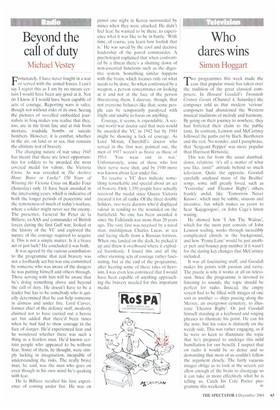Beyond the call of duty
Michael Vestey
Vortunately, I have never fought in a war
or served with the armed forces. I can't say I regret this as I am by no means certain I would have been any good al it. Nor do I know if I would have been capable of acts of courage. Reporting wars is safer, though not without risks of its own. Seeing the pictures of so-called embedded journalists in Iraq makes you realise that they, too, are in the front line and at risk from mortars, roadside bombs or suicide bombers. However_ it is combat, whether in the air, on land or at sea, that remains the ultimate test of bravery.
The changing nature of war since 1945 has meant that there are fewer opportunities for solders to be awarded the most coveted medal for valour, the Victoria Cross. As was revealed in The Archive Hour: Brave or Lucky? 150 Years of Winning the Victoria Cross on Radio Four (Saturday) only 11 have been awarded in the intervening years, which is indicative of both the longer periods of peacetime and the remoteness of much of today's warfare, where a soldier might never see the enemy. The presenter, General Sir Peter de la Billiere, ex-SAS and commander of British forces during the first Gulf war, looked at the history of the VC and explored the nature of the courage required to acquire it. This is not a simple matter. Is it a brave act or just luck?' le concluded it was both.
It was agreed by the various contributors to the programme that real bravery was not a foolhardy act but was one committed by someone who was aware of the dangers he was putting himself and others through. Those serving with him will be aware that he's doing something above and beyond the call of duty. He doesn't have to be a leader but has to be somebody who is quietly determined that he can help someone in distress and under fire. Lord Carver, former chief of the defence staff, modestly claimed not to have carried out a heroic act but added that there'd been times when he had had to show courage in the face of danger. He'd experienced fear and he wondered whether there was such a thing as a fearless man. He'd known certain people who appeared to be without fear. Some of them, he thought, were simply lacking in imagination, incapable of understanding the risks. The really brave man, he said, was the man who goes on even though in his own mind he's quaking with fear.
De la Billiere recalled his first experience of coming under fire. He was on patrol one night in Korea surrounded by mines when they were attacked. He didn't feel fear; he wanted to be there, to experience what it was like to be in battle. 'With time, of course, you learn how foolish that is.' He was saved by the cool and decisive leadership of the patrol commander. A psychologist explained that when confronted by a threat there's a shutting down of non-essential functions such as the digestive system. Something similar happens with the brain, which focuses only on what needs to be done. So when confronted by a weapon, a person concentrates on looking at it and not at the face of the person threatening them. 1 daresay, though, that not everyone behaves like that; some people can be temporarily paralysed with fright and unable to focus on anything.
Courage, it seems, is expendable. A second world war doctor said that men would be awarded the VC in 1942 but by 1944 might he showing a lack of courage. As Lord Moran, Churchill's doctor who served in the first war, pointed out, the men of 191/ weren't as brave as those of 1914: 'You wear out in war.' Unfortunately, some of those who lost their nerve were shot, and by 1940 more was known about fear under fire.
To receive a VC does indicate something remarkable and special about an act of bravery. Only 1,350 people have actually received the medal since Queen Victoria created it for all ranks. Of the three double holders, two were doctors who'd displayed valour in tending to the wounded on the battlefield. No one has been awarded it since the Falklands war more than 20 years ago. The very first was received by a naval man, midshipman Charles Lucas, at sea and facing shells from a Russian fortress. When one landed on the deck, he picked it up and threw it overboard where it exploded harmlessly. I found this and all the other stunning acts of courage rather fascinating, but at the end of the programme, after hearing some of these tales of heroism, I was even less convinced that I would have been capable of anything approaching the bravery needed for this important medal.


















































































 Previous page
Previous page